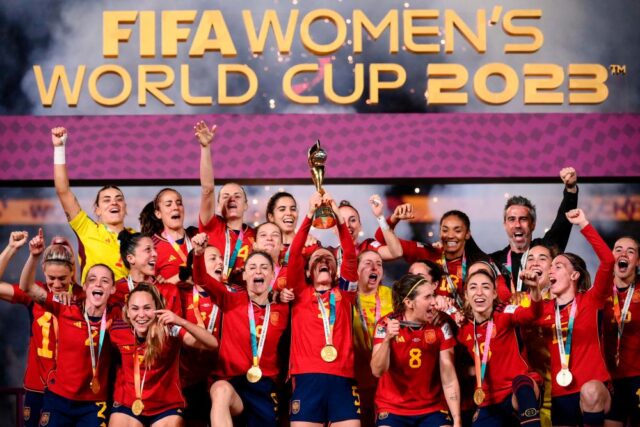The FIFA Women’s World Cup 2023 ended with Spain winning the Cup by defeating England 1-0 in the final. The win for Spain was important as the country’s women’s team was reeling under players’ revolt just months ahead of the tournament.
FIFA Women’s World Cup 2023- Some astonishing numbers
 It was an evening to remember as Spain and England played the final of the FIFA Women’s World Cup 2023 under the dazzling night sky with a whopping 75,784 spectators at Stadium Australia in Sydney. Spain lifted their maiden title by defeating England 1-0. An average of 30,000 spectators attended each match and a record of nearly two million tickets were bought during the month-long tournament [Source: The Guardian].
It was an evening to remember as Spain and England played the final of the FIFA Women’s World Cup 2023 under the dazzling night sky with a whopping 75,784 spectators at Stadium Australia in Sydney. Spain lifted their maiden title by defeating England 1-0. An average of 30,000 spectators attended each match and a record of nearly two million tickets were bought during the month-long tournament [Source: The Guardian].
This year’s Cup witnessed some fine players mesmerising the fans with their on-field excellence- Spain’s Aitana Bonmati, the player of the tournament, Olga Carmona, the goalscorer for Spain in both the semifinal and final, Japan’s Hinata Miyazawa, the highest goal-scorer, and England’s Mary Earps, the best goalkeeper.
Spain joining Germany
Spain and Germany became the only nations to win both Men’s and Women’s World Cup titles. This Spnaish triumph came 13 years after the Men’s team won the Cup in 2010. With this win, Spain proved that the rest of the world is catching up to the traditional powers of Women’s Football. While Germany, Brazil and the United States suffered early exits from the tournament, all the four semi finalists-Spain, England, Sweden and Australia- never won a World Cup before.
Spaniards erupted in joy after their team won the Women’s World Cup 2023. Fans celebrated on the streets and crowd cheered out loud. It was a dream of an entire country that transformed into reality.
Women’s World Cup 2023- A journey of Spain from turmoil to triumph
To win a World Cup, a team needs to be perfectly united with momentum and balance. Spain, in the year preceding Women’s World Cup 2023, had none of those things but was in a state of open revolt.
In September 2022, 15 players of the Spanish Women’s Football team sent 15 mails to RFEF President Luis Rubiales telling him they were quitting the team.
It is reported that after being knocked out by England in the quarter-finals of the Euro Cup, some players privately issued a formal complaint to the Federation about low-quality training sessions, lack of match analysis, insufficient rest and player privacy. It was only after this complaint went unacknowledged that the 15 players joined together to demand radical changes in the team’s structure.

However, the Federation remained steadfast and issued a statement saying, “only call upon players who are committed, even if that means playing with youth players”. The Spanish Women’s Football Team was built with young players and only three revolting players- Aitana Bonmati, Mariona Caldentey, Ona Batlle who returned to the squad.
A kind of truce was made and Spain arrived at the World Cup with a talented group of youngsters who showed grit and skill to win the ultimate trophy of World Football.

25-year old Aitana Bonmati solidified her position as one of the leading midfielders and 19-year-old Salma Paralluelo proved to be one of the most promising stars. The recovery from injury of two-time Ballon d’Or winner Alexa Putellas helped to put aside months of turmoil and division.
At the end, Spain’s young rising stars stood at the podium with their hands clasped around the trophy and signing off with a message that talent conquers all.




